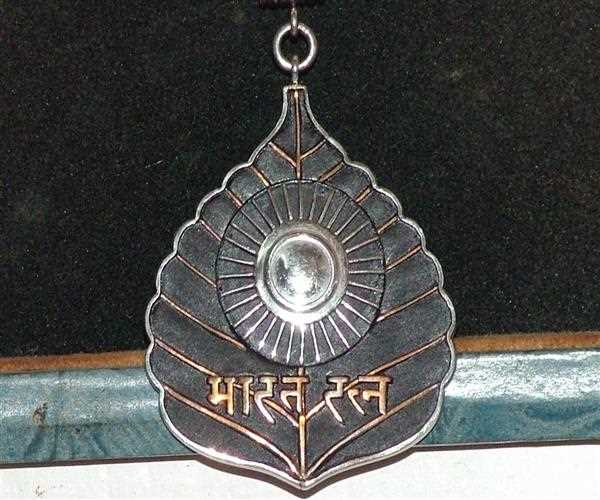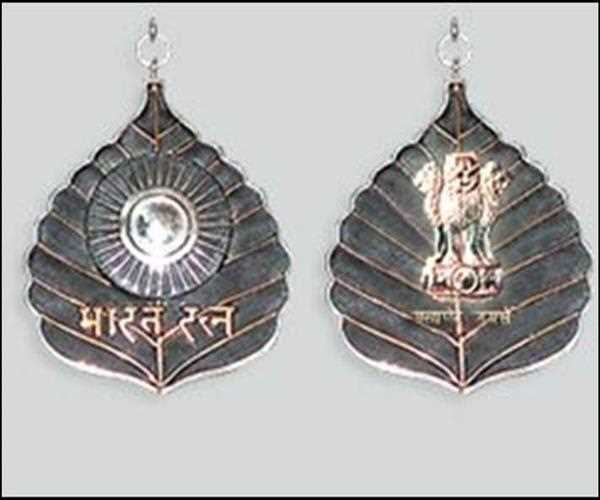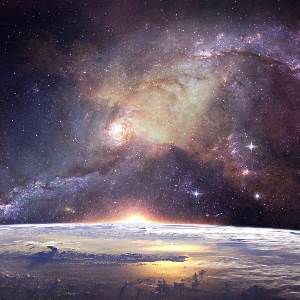
18-Nov-2021 , Updated on 11/18/2021 10:51:19 AM
facts about Bharat Ratna
BHARAT RATNA
introduction
This is the loftiest mercenary award of the democracy India. The Bharat ratna stand for jewels of India. The award, which was established on January 2, 1954, is given in honor of ' outstanding service/ performance of the loftiest order,' anyhow of race, vocation, status, or coitus. The award was formerly confined to achievements in the trades, literature, wisdom, and public service, but in December 2011, the government broadened the conditions to include any sphere of mortal accomplishments. The Prime Minister makes recommendations to the President for the Bharat Ratna, with a outside of three nominations being granted every time. A Sanad ( instrument) inked by the President and a Peepal splint- shaped order are presented to the honorees. The award doesn't come with a financial prize.

This peepal leaves printed with Indian emblem gifted with the highest honor. It is the 7th highest honorary award provided by Republic of India.
The main beneficiaries of the Bharat Ratna were: the last Lead representative General of the Territory of India – C. Rajagopalachari, second President and the principal VP of India – Sarvepalli Radhakrishnan, and Nobel Prize Laureate, Physicist C. V. Raman; who were regarded in 1954. From that point forward, the honor has been presented to 48 people, including 16 who were granted post mortem. The first rules didn't accommodate post mortem grants however were altered in January 1955 to allow them. Previous Executive Lal Bahadur Shastri turned into the main person to be regarded after death.. The primary vocalist to be granted Bharat Ratna was M. S. Subbulakshmi. However normally presented on India-conceived residents, the Bharat Ratna has been granted to one naturalized resident – Mother Teresa, and to two non-Indians: Abdul Ghaffar Khan (brought into the world in English India and later resident of Pakistan) and Nelson Mandela, brought into the world in and resident of South Africa. On 25 January 2019, the public authority declared the honor to social dissident Nanaji Deshmukh (post mortem), artist music Chief Bhupen Hazarika (after death) and to the previous Leader of India, Pranab Mukherjee.
The Bharat Ratna and other personal civil honor were halted temporarily in between July 1977 to January 1980, when a new government had formed again they done the same from August 1992 to December 1995. When multiple public-interest lawsuits challenged the constitutional legality of the awards. Those who refused to accept the truth of Subhas Chandra Bose's death, including some members of his extended family, challenged the government's decision to bestow the honor posthumously on him in 1992. The press release proclaiming Bose's prize was cancelled after a 1997 Supreme Court judgement; it was the only occasion the award was announced but not bestowed.
Several of the award's recipients have been chastised. The posthumous award for M. G. Ramachandran (1988) was seen as a way to appease voters ahead of the next assembly election, whereas the posthumous awards for Madan Mohan Malaviya (2015) and Vallabhbhai Patel (1991) were criticized because they died before the award was established.
HISTORY
The secretary to the President's office issued a press release on January 2, 1954, announcing the creation of two civilian awards: the Bharat Ratna, the highest civilian, and the three-tier Padma Vibhushan. they are again further classified into
1) Pahela Warg (Class I)
2) Dusra Warg (Class II),
3)Tisra Warg' (Class III)
these are rank below the Bharat Ratna. The Padma Vibhushan was split into three new awards on January 15, 1955: the Padma Vibhushan, which is the highest of the three, followed by the Padma Bhushan and the Padma Shri. There is no statutory need that Bharat Ratna awardees be Indian nationals. It has been given to two non-Indians, Abdul Ghaffar Khan of Pakistan in 1987 and former South African president Nelson Mandela in 1990, as well as a naturalized Indian citizen, Mother Teresa, in 1980. The first musician to get the award was Tamil Nadu's M. S. Subbulakshmi . Sachin Tendulkar is the youngest at the age of 40 and first sportsperson to earn the award . Dhondo Keshav Karve was respected on his 100th birthday, April 18, 1958, in a special event. As of 2015, 45 persons had received the honour, including 12 posthumous declarations.
Regulations
The Bharat Ratna is awarded in appreciation of outstanding service/ performance of the loftiest position,' anyhow of race, occupation, status, or gender. According to the 1954 rules, the prize was limited to the trades, literature, wisdom, and public service. The regulations were revised in December 2011 to encompass 'any sphere of mortal bid.'
Postmortem honors weren't permitted under the 1954 legislation, but this was changed in the January 1955 act, and Lal Bahadur Shastri came the first winner to be fete posthumously in 1966.
Although there's no formal nomination procedure, the Prime Minister can only make recommendations to the President for the award, which can only be given to a outside of three appointees each time. In 1999, still, four people were given the honor. Without any financial award, the favorite receives a Sanad ( instrument) inked by the President and a order.
As reported on the Supreme Court's paradigm in Balaji Raghavan / S.P. Anand case: Union of India in 1995, the honoree's use of the term 'Bharat Ratna' as a prefix is free from Composition 18 (1) of the Constitution. Also awardees may use the expression 'Awarded Bharat Ratna by the President ' or ' Awarded Bharat Ratna by the President ' Or ' Bharat Ratna Award Philanthropist ' to signify that they've entered the award. In the Indian order of priority, the liaisons of the Bharat Ratna are ranked eighth.
The donors of the award are notified and registered in The Review of India, a review published by the Ministry of Urban Development's Department of Publication for sanctioned government matters; conferral of the award isn't supposed functionary without publication in the Gazette. The donors of abandoned or reinstated awards, both of which bear the President's blessing, are listed in the Gazette. Donors whose awards have been abandoned are needed to surrender their orders, and their names are struck from the register. Recipients whose awards have been revoked are required to surrender their medals, and their names are struck from the register.
Specifications
The award's initial 1954 requirements were for a gold circle measuring 1+38 inches (35 mm) in diameter with a sun burst design in the centre on the reverse side.
The text 'Bharat Ratna' is engraved in Devanagari Script on the upper edge, with a wreath arranged along the lower edge. on the other face , a platinum State Emblem of India was written in silver-gilt with the national slogan 'Satyameva Jayate' in Devanagari Script (Sanskrit: ; lit. 'Truth alone triumphs') imprinted in Devanagari Script (Sanskrit: ; lit. 'Truth alone triumphs').
The design was changed a year later. The present medal is shaped like a peepal leaf and is roughly 2+516 inches (59 mm) long, 1+78 inches (48 mm) broad, and 18 inch (3.2 mm) thick, with a platinum rim. The embossed sun burst design on the obverse side of the medal measures 5/8 inch (16 mm) in diameter, with rays extending from 5/6 inch (21 mm) to 12 inch (13 mm) from the Sun's center. The phrases 'Bharat Ratna' on the obverse side, as well as the India symbol and 'Satyameva Jayate' on the reverse side, remained unchanged from the 1954 design. The medal comes with a 2-inch (51 mm) white ribbon that can be worn around the neck. The silver-gilt ornamentation was replaced with polished bronze in 1957.
The Bharat Ratna medals, as well as other civilian and military decorations such as the Padma Vibushan, Padma Bhushan, Padma Shri, and Param Veer Chakra, are made in the Alipore Mint in Kolkata.
Controversies
While acting as Prime Minister of India in 1955, Jawaharlal Nehru was accused of granting himself the Bharat Ratna. This claim was debunked by The Wire's fact-checking team, as the then-President of India, Rajendra Prasad, admitted that he bestowed the award on Nehru 'without any recommendation or advice from the Prime Minister or the Cabinet' for Nehru's successful visit to Europe and the Soviet Union (a visit aimed at promoting peace as the Cold War raged on) and Nehru's contribution towards the emerge of India as a leader role in global politics. Similar charges have been made about Nehru's daughter Indira Gandhi, who took over as India's third Prime Minister. These allegations were also shown to be false because Indira Gandhi received this medal from then-Indian President V. V. Giri for leading India to victory in the 14-day 1971 conflict with Pakistan over East Pakistan (now Bangladesh). Indira Gandhi was honoured by President V. V. Giri, who assumed entire responsibility for the honour.
However, after Rajiv Gandhi was killed by the LTTE in 1991, he was posthumously given the Bharat Ratna. The ruling and opposition parties came to a unified consensus.
Subash Chandrabose (1992)
The President's Secretariat issued a press statement on January 23, 1992, announcing that Subhas Chandra Bose will receive the honour posthumously. The ruling drew widespread condemnation, prompting a petition in the Calcutta High Court to have the award revoked. The petitioner objected to the award's conferral and posthumous mention of Bose, claiming that honouring a personality greater than the prize is 'crazy' and that classifying such a person with previous and future recipients was an act of 'carelessness.'
The award could not be given to Bose posthumously because the government had not formally recognised his death on August 18, 1945, according to the statement. The applicant mentioned the whereabouts of Bose from 18 August 1945 to date, in view of the data gathered by the 1956 Shah Nawaz Council and the 1970 Khosla Commission. Bose's relatives communicated their reluctance to acknowledge the award.To convey the judgment, the High Court framed an Uncommon Division Seat with Judge Sujata V. Manohar and G. B. Pattanaik. The Specialist General noticed that to give the honor per the fitting guidelines relating to the Bharat Ratna, Padma Vibhushan, Padma Bhushan, and Padma Shri, the name of the beneficiary should be distributed in The Periodical of India and entered in the beneficiaries register kept up with under the heading of the President.It was noticed that main a declaration had been made by press dispatch, yet the public authority had not continued to present the honor by distributing the name in the Newspaper and entering the name in the register. Moreover, the then presidents, Ramaswamy Venkataraman (1987–92) and Shankar Dayal Sharma (1992–97), had not given a Sanad (testament) with their mark and seal on 4 August 1997, the Supreme Court instructed that since the award had not been officially given , it cannot be revoked and declared that the press release to be treated as cancelled. The court had refused to give any judgement on the posthumous mention of Bose and his death.
Civilian awards as titles
In 1992, two PILs were proved in the High Courts; one in the Kerala High Court on 13 February 1992 by Balaji Raghavan and one further in the Madhya Pradesh High Court (Indore Seat) on 24 August 1992 by Satya Buddy Anand. The two aspirants scanned the regular citizen subventions being' Titles'per an understanding of Composition 18 (1) of the Constitution. (b) On 25 August 1992, the Madhya Pradesh High Court gave a announcement briefly suspending every single non military help entitlement. An Exceptional Division Seat of the High Court was framed including five adjudicators;A.M. AhmadiC.J., Kuldip Singh,B.P. Jeevan Reddy,N.P. Singh, andS. Saghir Ahmad. On 15 December 1995, the Exceptional Division Seat reestablished the honors and conveyed a judgment that the'Bharat Ratna and Padma subventions aren't titles under Composition 18 of the Constitution'.
Criticism
In 1988, also, at that point, PM Rajiv Gandhi (1984 – 89) gave the Bharat Ratna post mortem on film imitator and former Boss Pastor of Tamil Nadu,M.G. Ramachandran, in a shot to impact citizens antedating the Tamil Nadu gathering races in 1989. The choice was condemned for granting Ramachandran before freedom lobbyistB.R. Ambedkar and Vallabhbhai Patel, who were presented the honor in 1990 and 1991, independently. While Ravi Shankar was criticized for campaigning for the award, the choice by Indira Gandhi to after death honorK. Kamaraj was considered to have been refocused toward assuaging Tamil citizens for the Tamil Nadu get together races in 1977. The seventh Leader Vishwanath Pratap Singh was condemned for after death regardingB.R. Ambedkar to satisfy the Dalits
The post mortem conferments of the honor on the heirs who demurred the pail before the Indian freedom in 1947 or the honor was established in 1954 have been reprimanded by scholars of history. It was noticed that similar conferments could prompt further requests to admire individualities like Maurya Ruler Ashoka, Mughal Sovereign Akbar, Maratha Head Shivaji, Nobel Laureate Rabindranath Tagore, Hindu Jeremiah Master Vivekananda; and freedom lobbyist Bal GangadharTilak.The also, at that point, LeaderP.V. Narasimha Rao (1991 – 96) was censured for presenting the honor to Vallabhbhai Patel in 1991, 41 times after his end in 1950; and upon Subhas Chandra Bose in 1992, who demurred the pail in 1945. In 2015, the PM Narendra Modi's choice to grant Madan Mohan Malaviya, who passed on in 1946, near the races in Uttar Pradesh met with analysis. A couple of the conferments have been scanned for esteeming characters solely after they got worldwide acknowledgment. The honor for Mother Teresa was declared in 1980, a time after she was granted the Nobel Harmony Prize. Satyajith Beam got an Institute Privileged Honor in 1992 followed by the Bharat Ratna a analogous year. In 1999, Amartya Sen was granted the Bharat Ratna, a time after his 1998 Nobel Fidelity Prize in Monetary loreses . The honor was proposed by Head director Atal Bihari Vajpayee to President K.R. Narayanan who acceded to the proposition.
Famous demands
However, according to the rules for the Bharat Ratna, the proposals for the honor must be made by the Head administrator to the President, there have been a few requests from different ideological groups to respect their chiefs. In January 2008, Bharatiya Janata Party (BJP) pioneer L. K. Advani kept in touch with the Executive Manmohan Singh suggesting Singh's archetype Atal Bihari Vajpayee for the honor. This was promptly trailed by the Socialist Coalition of India (communist) campaigning for their chief, Jyoti Basu, previous Boss Priest of West Bengal. Basu, India's longest-serving boss priest around then, said that he would decrease the honor, regardless of whether granted. Comparable requests were made by Telugu Desam Party, Bahujan Samaj Party, and Shiromani Akali Dal for their particular chiefs N. T. Rama Rao, Kanshi Slam, and Parkash Singh Badal.In September 2015, territorial ideological group Shiv Sena requested the honor for the autonomy dissident Vinayak Damodar Savarkar expressing that he had been 'purposely dismissed by past states' however his family explained that they are not making such interest and that the political dissident is known for his commitment towards freedom development and didn't require an honor for acknowledgment. Per the first rules, sportspersons were not qualified for the Bharat Ratna; nonetheless, an amendment of the principles in December 2011 made qualified 'any field of human undertaking'. Hence, a few sportspersons' names were examined; among the most discussed of these were field-hockey player Dhyan Chand and previous world chess champion Viswanathan Anand. In 2011, 82 individuals from parliament prescribed Chand's name for the honor to the Head administrator's Office. In January 2012, the Service of Youth Undertakings and Sports sent his name once more, this time alongside 2008 Summer Olympics gold medallist shooter Abhinav Bindra and mountain dweller Tenzing Norgay.Bindra had before been suggested for the honor in May 2013 by the Public Rifle Relationship of India.In July 2013, the service again suggested Dhyan Chand.However, in November 2013, cricketer Sachin Tendulkar turned into the principal sports-individual to get the honor and this accumulated a lot of analysis for the public authority.
A PIL was documented in the Karnataka High Court where in the solicitor mentioned the court to give a heading to the Service of Home Undertakings to consider their portrayal dated 26 October 2012 and present the Bharat Ratna upon Mahatma Gandhi. On 27 January 2014, a guidance showing up for the solicitor noticed that after numerous portrayals from the applicant, they were furnished with the data under RTI that the suggestions to present the honor on Gandhi have been gotten on different occasions before and were sent to the PM's Office. A Division seat involving Boss Equity D.H. Waghela and Equity B.V. Nagarathna excused the appeal expressing that the subject isn't amiable to any arbitration interaction and the designations and conferment process is expressed to be casual and in the caution of the greatest power in the Public authority.


Student
I am an enthusiastic writer with profound knowledge on various diaspora. my insights on what I has posted is best fact checked. I had prolific knowledge on various aspects.
Join Our Newsletter
Subscribe to our newsletter to receive emails about new views posts, releases and updates.
Copyright 2010 - 2026 MindStick Software Pvt. Ltd. All Rights Reserved Privacy Policy | Terms & Conditions | Cookie Policy